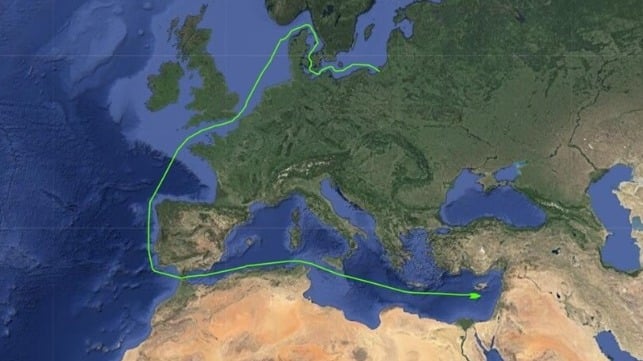As Russia's "Syrian Express" Takes the Long Way Home, NATO is Watching
In April, the Portuguese Navy tracked Sparta IV off Algarve; U.S. forces have taken up the job in the Med

On the night of May 1, a U.S Air Force drone took off from the U.S base of Sigonella, Italy, ostensibly to investigate the activities of the Russian cargo ship Sparta IV (IMO: 9743033). As previously reported by Maritime Executive, and later shared by Italian media, Sparta IV made a U-turn and did not enter into the Black Sea, as she has done for years on a regular rotation; instead, the ship took a long voyage around Europe to Kaliningrad, a weeks-long detour.
The vessel is known, along with others, as part of the ‘ghost fleet’ as reported by NATO Defense College - a fleet of civilian cargo ships allegedly transporting military materiel from the Russian bases in Syria to the Ukraine frontline (also called ‘The Syrian express’). In the past, they may have breached the Montreux Convention.
After reaching Baltiysk (in Russia's Kaliningrad exclave), where Sparta IV remained more than 20 days, the ship left on April 16 for the Russian military base in Tartus, Syria, where she is expected to arrive in the first week of May.

Courtesy Giangiuseppe Pili / Alessio Armenzoni
After passing through the Sicilian Channel, a U.S Navy Northrop Grumman MQ-4C reconnaissance drone took off from Sigonella Air Base in Sicily on an overnight mission, following a route possibly parallel to that of the Sparta IV. When in proximity to the vessel, the drone entered a holding pattern, possibly monitoring the further movements of the ship.
The U.S drone then returned to the U.S base in Sicily, and Sparta IV continued her journey to Syria, where she could arrive by May 4.
Giangiuseppe Pili (Ph. D.) is an Assistant Professor in the Intelligence Analysis Program at James Madison University. He is an Associate Fellow at Open Source Intelligence and Analysis at the Royal United Services Institute.
Alessio Armenzoni is a geospatial intelligence analyst working on projects related to maritime security. He studied at the Centre for Higher Defense Studies from the Italian MoD.
The opinions expressed herein are the author's and not necessarily those of The Maritime Executive.
